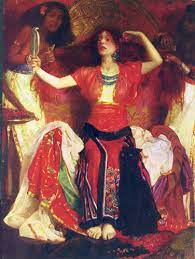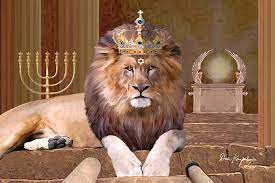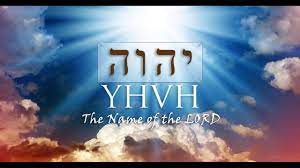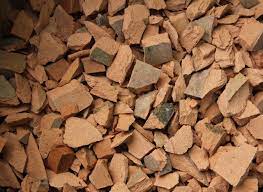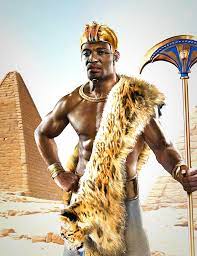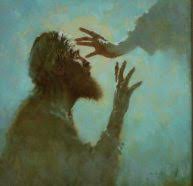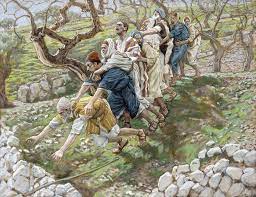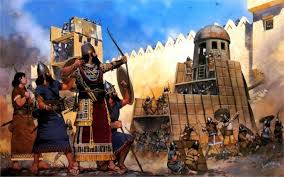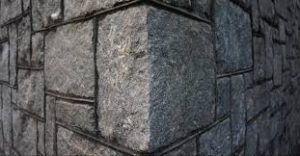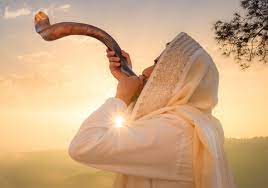Ga – Till the Spirit is Poured upon Us From on High 32: 15-20
Till the Spirit is Poured upon Us From on High
32: 15-20
Till the Spirit is poured upon us from on high DIG: What will the restored Kingdom look like? How do these promises of God compare with those given earlier (see 28:16, 29:17-24, 30:19-26, 32:1-8, 33:20-24)? What is distinctive about the imagery Isaiah uses to convey his message?
REFLECT: How does Isaiah understand what the outpouring of the Spirit will be like on the LORD’s people? How does that compare to the disciples’ question in Acts 1:5-6? Which is closer to your own view of what it means to be filled with the Spirit? How so? What does Isaiah say about God’s ultimate desire for you?
Here there is a swift change from the prophecy of warning to the prophecy of salvation. Once again Isaiah leaps forward to the far eschatological final invasion by all the nations of the world. Here, after speaking of the devastation of Judah, Isaiah describes a future time of blessing in the Land and of the people, for when the Great Tribulation is finally over and God is ready to restore Isra’el, the Messianic Kingdom will be initiated by the outpouring of the Ruach Ha’Kodesh. Why? Because Yeshua Messiah cannot come back until He is recognized for who He is, and invited back by the nation of Isra’el (see the commentary on Revelation, to see link click Ev – The Basis for the Second Coming of Jesus Christ). Speaking of the believing remnant, Zechariah prophesies: And I will pour out on the house of David and the inhabitants of Jerusalem the Spirit of grace and supplication. They will look upon Me, the One they have pierced and they will mourn for Him as one mourns for an only child, and grieve bitterly for Him as one grieves for a first born (Zech 12:10-11).
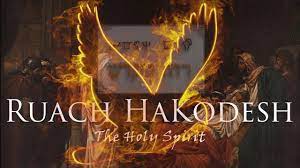
These Scriptures beg for the question, “How long will the judgment continue? How long will the devastation of Judah last?” ADONAI answers and says: Until the Spirit of God is poured upon us from on high, and the desert becomes a fertile field, and the fertile field seems like a forest (32:15). This says basically the same thing as 29:17 except the desert is substituted for Lebanon. The picture is one of abundance. What was formerly useless for crops will become fertile, while what was fertile will be become a virtual jungle. Is anything to hard for the LORD (Genesis 18:14a)?
The judgment will continue until Isra’el’s national regeneration (Zechariah 12:10-14; Joel 2:28-32) and the means of this regeneration is the outpouring of the Ruach Ha’Kodesh. At that time, the Land will again produce and become fruitful. Joel makes the very same point. In Joel 1:15, he begins to describe the Day of the Lord, the term in the TaNaKh for the Great Tribulation (in this case the end of the Great Tribulation). He first describes the Day of the Lord and the judgments that will be poured out in the remainder of Chapter 1 and the first part of Chapter 2, and then he describes the total devastation of the crops as a result of the tribulation judgments. But notice Joel 2:21-27. After showing that there will be a massive devastation in the Great Tribulation that will destroy the crops of Isra’el, he describes the regeneration of the land and the crops. In verses 2:15-20, he describes the destruction of any further armies that would come against Isra’el. But in Joel 2:21-27, he describes the restoration of the crops. Then in 2:28-32, in the same context, he links the restoration of the Land with the pouring out of His Spirit. Other prophets also spoke of this outpouring of the Ruach Ha’Kodesh (Ezeki’el 36:26-27; Joel 2:28-29 and Zechariah 12:10).
We find the very same thing in Isaiah 32. Devastation is seen in 32:12-14 until Judah becomes a wasteland. But that is going to change. When Isra’el is restored (Zechariah 12:10-14) there is going to be an outpouring of the Holy Spirit (Isaiah 33:15 and Joel 2:28-32). And what is now a wilderness will become a fertile field, and what is now a fertile field will be considered a wilderness by comparison. The LORD has a way of both reversing disaster at the last minute (37:36), and overlooking beyond disaster to what He, in His steadfastness, determines to do.
As the redeemed of Isra’el enter the Millennial Kingdom, they will have the same benefit of the indwelling presence of the Holy Spirit as do believers in the Church Age today. Therefore, they will have an inward desire to do the will of God (Ezeki’el 36:27). There will be four results.
First, justice will dwell in the desert and righteousness live in the fertile field (32:16). True abundance will be in matters of the spirit. From Isaiah’s point of view, Judah’s relationship with ADONAI had been like a desert. Righteousness and justice had withered away while the people had abandoned God’s ways and pursued after their own goals. This had led to the oppression of the poor and a disastrous foreign policy. Judah had, in effect, cut herself off from her source of life. But in the far eschatological future, she would live in relationship with her God and holy living will once again be hers.
Secondly, the results of righteousness will be peace (9:6 and 59:8-9), quietness, and confidence forever. My people will live in peaceful dwelling places, in secure homes, in undisturbed places of rest (32:17-18). This is seen more clearly in the progressive revelation of the B’rit Chadashah. The person who has received the grace of the LORD’s forgiveness is at peace with Him. For He Himself is our peace (Ephesians 2:14a). When Yeshua’s character is central in our lives, we don’t have to lean upon others to supply our own needs. The fact that this has not produced significant long-term changes in the world is a testimony to the extent of our sin nature. I don’t know about your neighborhood, but there is no “Garden of Eden” sign posted in mine!
Thirdly, the destruction of Isra’el’s enemies is seen. Though hail flattens the forest and the city will be leveled completely (32:19). Again, Isaiah refers to a specific city that will be leveled completely at the time of Isra’el’s restoration, which, in conjunction with earlier Isaiah passages, would be the city of Babylon (see Dk – Babylon, the Jewel of Kingdoms, will be Overthrown).
Fourthly, we see material blessings for those in the Messianic Kingdom. How blessed you will be, sowing your seed by every stream, and letting your cattle and donkeys roam free (32:20). Even the animals will be able to roam free among the crops because the crops will be so plentiful. Blessing (asre) has three shades of meaning: under divine blessing (Psalm 32:1), enjoying fulfillment of life (Psalm 112:1), and doing the right thing at the right time (Psalm 2:12, 137:8-9). For the believer in Yeshua Messiah, all three are seen in the Messianic Kingdom: divine favor, personal fulfillment and total righteousness.
We have already seen the close association of the Holy Spirit with the messianic promise (see Dc – A Shoot Will Come Up from the Stump of Jesse). It is because the Spirit of ADONAI rests on Messiah that He is able to rule as He does. Not only Him, but also the members of His Kingdom (32:1-8). John the Immerser underscored this when he differentiated himself from Messiah by saying that he only baptized with water, whereas, Messiah would immerse with the Ruach Ha’Kodesh and fire (John 7:37-39). So now, just as Isaiah had promised, the Messiah, through the Spirit that the Father has given, makes it possible for believers to live a life of true nobility – one of generosity and self-giving, one of justice and righteousness, one that the uncertainties of this life cannot ultimately disrupt. There are inner resources with which to meet everything that comes to us and to triumph over them. That is the Good News.113



